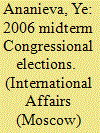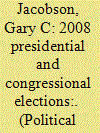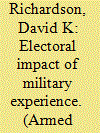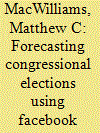| Srl | Item |
| 1 |
ID:
074196


|
|
|
| 2 |
ID:
087665


|
|
|
|
|
| Publication |
2009.
|
| Summary/Abstract |
Gary C. Jacobson analyzes the 2008 presidential and congressional elections. He concludes that the elections were, through myriad pathways, largely a referendum on the Bush administration and a reaction to the economic meltdown. He questions whether Democratic Party control of the presidency and Congress will be a stable phenomenon.
|
|
|
|
|
|
|
|
|
|
|
|
|
|
|
|
| 3 |
ID:
187112


|
|
|
|
|
| Summary/Abstract |
The belief that a military veteran candidate receives an electoral benefit at the polls based on a history of military service remains a widely held assumption in American politics. However, this assumption of a veteran electoral bonus has rarely been studied by scholars and the limited literature displays mixed results. This article presents the findings of a new study that addresses the mixed results in the literature and presents evidence that demonstrates that certain types of military veteran candidates do gain a veteran bonus in congressional elections. This advantage over nonveterans is conditioned by party, the type of race, and the nature of military service. By analyzing general election races for the United States Senate over 34 years (1982–2016), the study uncovers support for Democratic candidates with military service receiving an electoral bonus at the polls. This electoral bonus is most widely enjoyed by Democratic veterans in open Senate races and with experience in deployed warzones. The key findings suggest that previous conclusions in the literature with respect to establishing a veteran bonus in congressional elections should be reexamined to expand the time period of analysis, restructure the characterization of military experience beyond a binary variable, and include both House and Senate elections.
|
|
|
|
|
|
|
|
|
|
|
|
|
|
|
|
| 4 |
ID:
141821


|
|
|
|
|
| Summary/Abstract |
Facebook constantly tracks the growth of each congressional candidate’s fan base and the number of people engaging with candidates online. These Facebook metrics comprise a rich dataset that theoretically may capture the effectiveness of campaigns in building participatory support as well as their potential to mobilize support. When added to electoral fundamentals similar to those used in national-election forecasting, can Facebook data be used to develop a reliable model for predicting vote-percentage outcomes of individual congressional contests? The results of an exploratory investigation reveal that fan participation and mobilization metrics tracked by Facebook produced surprisingly accurate election predictions in the 2012 US Senate races studied. The question remains, however, whether these results are a “flash in the 2012 pan” or an indication that using Facebook statistics to measure campaign effectiveness is a new tool that scholars can use to forecast the outcome of congressional campaigns.
|
|
|
|
|
|
|
|
|
|
|
|
|
|
|
|